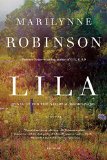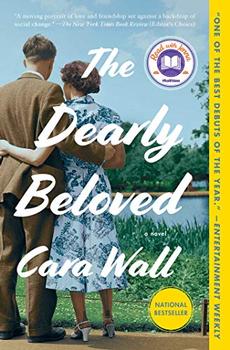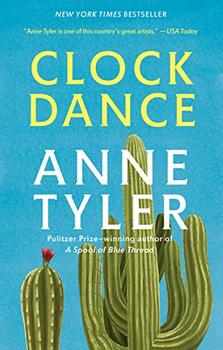Summary | Excerpt | Reading Guide | Reviews | Beyond the book | Read-Alikes | Genres & Themes | Author Bio

The child was just there on the stoop in the dark, hugging herself against the cold, all cried out and nearly sleeping. She couldn't holler anymore and they didn't hear her anyway, or they might and that would make things worse.
This is how Marilynne Robinson's beautiful, tender and melancholy novel begins, with the protagonist, Lila, remembering herself as an abused and badly neglected child on the night a homeless woman known as Doll, a migrant drifter during the desperate times of the Depression, snatched her away.
The story toggles back and forth from childhood and adolescent memories—traveling with Doll and Lila's time spent in a brothel in St. Louis—to the present, with Lila's arrival in the small Iowa town of Gilead. It is in Gilead that Lila meets the lonely and much older, but wise and kind widowed minister, John Ames.
While Lila keeps her memories to herself, she often thinks she'd like to share them with the preacher so he could know all her stories: the sadness she has seen and lived through, and the people she has known who struggled to make do through the worst of times. Lila's thoughts flow into each other from the past to the present, as she struggles with her sense of self-worth, bearing the shame of poverty, of abandonment, of not belonging. Shame is a major theme throughout. But while Lila's journey carries these burdens, it is also touched by courage and kindness. Doll, a hard woman with a sharp knife, saves Lila's life by snatching her away from an abusive situation and nurses her back to health with surprising tenderness and devotion. There are other acts of grace along the way that help cushion some of the hardships Lila faces.
In contrast to many novels, Lila is quiet and contemplative, deeply profound, filled with universal, ethical and philosophical questions about the nature of existence that thoughtful readers will relate to: why are we here, does life have meaning and purpose? Although Lila considers herself simple, rough and ignorant, she spends most of her time pondering the meaning of life:
There are the things people need and the things people don't need. That might not be true. Maybe they don't need existence. If you took that away, everything else would go with it. So if you don't need to exist, then there is no reason to think about other things you don't need as if they didn't matter. You don't need someone standing beside you. You don't, but you do. Take away every pleasure—but you couldn't because there can be pleasure in a sip of water. A thought.
Throughout, Lila copies passages out of the Bible, seemingly to improve her writing skills. But Lila also recognizes her own struggles in many of the passages that connect to the questions about life. Later, as Lila and John Ames slowly get to know each other, she has more deep questions for him about the Bible and about his sermons:
What do you ever tell people in a sermon except that things that happen mean something. Some man dies somewhere a long time ago and that means something. Then why don't you say how you know that? Do you just talk that way because you're a preacher? This kind of thinking made a change in her loneliness, made it more tolerable for her. And she knew how dangerous that could be.
The preacher is unable to answer many of Lila's probing questions concerning Christian beliefs, for instance, those related to the doctrine that good yet unbaptized people would be consigned to Hell. John Ames admits his own brand of shame for this shortcoming.
Loneliness is another major theme. It is one of the elements that draws the preacher and Lila to each other; yet they find it difficult to trust one another after living solitary lives for so long. Lila's lack of self-esteem makes her continually expect the Reverend to send her away, to decide he doesn't want her there after all, just as he expresses his fear to her that she will leave him for a younger man. Even after they are married, she continues to question her value, worth and purpose. She thinks:
I am baptized, I am married. I am Lila Dahl, and Lila Ames. I don't know what else I should want. Except for the shame to be gone, and it ain't. I'm in a strange house with a man who can't even figure out how to talk to me. Anything I could do around here has been done already. He'll ask me to leave and no one will blame him. Marriage was supposed to put an end to these miseries.
The pace is slow and ponderous—some readers may find it too languorous for their taste. While this is not by any means a plot-driven novel but mostly a progression of thoughts and memories soaked in emotions—there are a few mysteries that pull the reader along, in particular the question of what happened to Lila's surrogate mother, Doll. A myriad of memories and Lila's one valued possession—Doll's knife—keep the question alive until close to the end.
Lila is a prequel to Gilead and Home, but you don't need to be familiar with either book to read and enjoy Lila. I recommend it to thoughtful readers who like their novels deep and emotionally rich. It's worth (re)reading the other novels in the trilogy for good measure so you can spend more time with Lila, her family and the community she chooses to make her home.
Additional Information
President Barack Obama had a wide-ranging conversation with the author of Lila, Marilynne Robinson, in which they discussed among other things, the role of faith in her writing. The two-part article for The New York Review of Books is worth reading.
![]() This review was originally published in The BookBrowse Review in November 2014, and has been updated for the
November 2015 edition.
Click here to go to this issue.
This review was originally published in The BookBrowse Review in November 2014, and has been updated for the
November 2015 edition.
Click here to go to this issue.

If you liked Lila, try these:

by Cara Wall
Published 2020
A luminous debut novel about two young couples whose lives become intertwined when the husbands are appointed co-ministers of a venerable New York City church in the 1960s, spanning decades - for readers of Ann Patchett and Nicole Krauss.

by Anne Tyler
Published 2019
A delightful novel of one woman's transformative journey, from the best-selling and Pulitzer Prize-winning writer.
Your guide toexceptional books
BookBrowse seeks out and recommends the best in contemporary fiction and nonfiction—books that not only engage and entertain but also deepen our understanding of ourselves and the world around us.